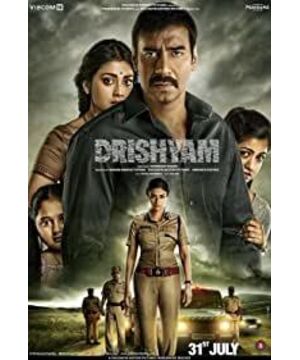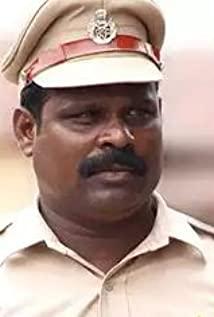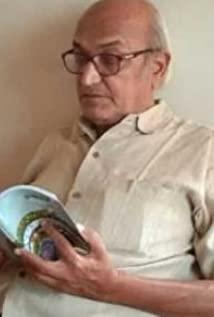Fortunately, I read the original version first, otherwise, there may be some prejudice in it.
When I first opened the screen, I felt that the film was too long. For more than two hours, it makes people feel withdrawn. But luckily it persevered.
There is a movie that has to get through the plot sections that are not easy to enter the drama, in order to make the subsequent plot more attractive.
Now that I have read both the Indian original and the mainland remake, and then I look at the original in reverse, I find that the length of time that I disliked it in the first place is the core of the original.
In a drama, the fluency and logic of the plot are the core of an excellent film. Although the original version is more than 2 hours long, it tells the whole story smoothly and wonderfully.
Mainland movies have a very interesting feature - they like the value, and they play emotional cards. The evil must not win the right, and if there is a crime, the law must be subverted.
But, in fact, in real life, let alone the modern 21st century, it has not been 100% since the birth of human law.
There is no pure distinction between good and evil in the world, and the outcome of India is more in line with the actual operation.
There are not so many so-called "virgins" and "discoveries of conscience" in the world, so how come there are so many?
Of course, this can also happen, but the logic must make sense and be self-consistent.
This is also the reason why domestic dramas are rarely watched.
Speaking of the original movie, the male protagonist has always been a man with strong learning ability, meticulous logic, strong heart, and bravery.
In the first half hour, although it looked a little dull, it paved the way for the family's follow-up interrogation, explaining each character's character and three points of view. This is what makes the story behind it intertwined.
The most interesting thing about the original version is that every time the family was interrogated, the reactions and actions they showed were explained to the audience in the last second. It uses the front and rear shots to explain the character's motivation, so it can easily get the audience to empathize with the character.
In novels and scripts, there will be such interspersed narrative methods, but in movies, how to show it naturally and without traces is the director's foundation and ability.
The Indian version, the finale, is a must. The second burial of the male protagonist and the innocent walking out of the police station, the seamless switching between the two scenes is simply the finishing touch of the whole play.
In particular, the male protagonist's eyes and the decisiveness of his walking pace - in order to protect his daughter and his family, he knew that it was impossible to go back, and for the sake of his family, he would bring this secret to the grave.
If you really want to say something, it may be moving a plot from a domestic remake to the Indian version, which may make the whole story appear more plump and three-dimensional.
In the Indian version, the daughter was photographed taking a bath, and the boy threatened to meet at the warehouse at home late at night. The mainland remake is that during the summer camp, the boy raped his daughter with juice, and even filmed a video, threatening the daughter to submit again.
Compared with the domestic version, in the Indian version, the boys are not so bad boys, and according to the case of so many women being insulted in India, being photographed nude seems a bit pediatric.
I don't know if the daughters and boys in the play are both high caste groups, and the incidents of being insulted will be slightly less? Or is the humiliation of high castes a sensitive point in India?
Compared with the Indian version, the most unacceptable ending of the domestic reform is not the one who surrendered himself, but the part where the mother gave the test paper to the male protagonist, and the sentence that the male protagonist said—— I have always been a father with no ability, the only thing I can do is stand in front of you.
This change is really embarrassing. At the very beginning of the play, the father played by Xiao Yang is depicted, and his relationship with the daughters is not very good, especially the eldest daughter hates her father.
The subsequent plot promotion made the hearts of the family unite and advance and retreat together.
A little daughter ran out now and changed her score to get a reward. Wanting to guide the audience, the youngest daughter was influenced by her father.
This is so bullshit. A little girl who is only six or seven years old, after going through so many twists and turns and nightmarish censorship with her family, is no longer bothered by this matter so soon, and will directly take detours and change her score.
Is this saying that the little girl's IQ is too high, or that her ability to withstand pressure is too strong? Or did the screenwriter treat the little girl as an adult with a complete system?
This logic point is not self-consistent.
The subsequent father, for the sake of his family and as a model for his daughter, turned himself in, and the ending was not so shocking.
Chinese people who are deeply influenced by Confucian culture, whether in filming or in life, will always subconsciously deepen their actions, or strive to make themselves positive, optimistic, decent and moral.
What kind of gentleman is magnanimous, and the villain is always affectionate.
Evil cannot overcome righteousness.
Do not do to others what you do not want to do to yourself.
Being regulated by these, but also bound by these. Those so-called elites, good-hearted people, are nothing more than that.
View more about Drishyam reviews











